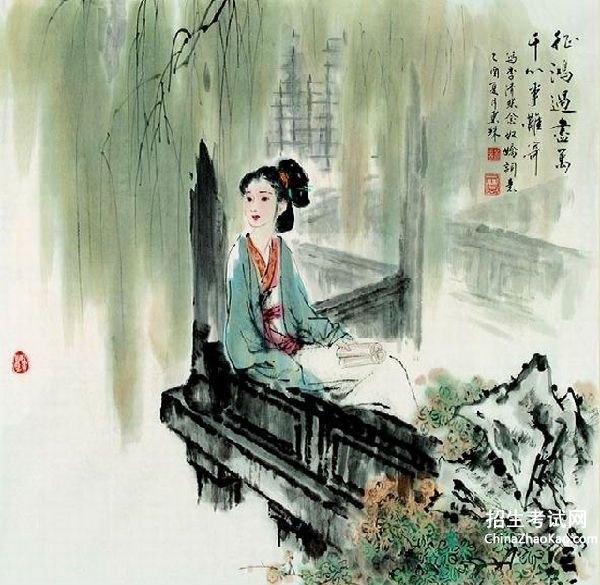寒食翻译
成考报名 发布时间:03-18 阅读:
篇一:《寒食节翻译》
寒食节
清明节是一个祭祀祖先的节日,它是农历的二十四节气之一。每年的4月4日至6日。节日过后,气温上升,降水量增加,农民们会在此时准备春耕播种。 清明节前一天是寒食节,在此日,不许生火,人们只能吃寒食。吃寒食的缘由说来话长。相传是为了纪念春秋时期的介子推而制定的,介子推是晋国的忠臣,在兵乱时期服侍晋公子重耳。重耳被迫带着他的臣子(包括介子推)离开晋国。在流亡期间,他们饱受屈辱与困难。介子推为了救重耳,从自己大腿上割下了一块肉,煮熟了送给重耳吃。然而,当重耳历经磨难终于成为君主时,重耳在分封群臣时却忘记了介子推,尽管介子推曾救了他的命。介子推寒心至极遂携老母隐居山里。
重耳心中有愧于介子推于是亲自来到山里找他,但是面对无边的树林绵延的青山,找到他犹如大海捞针。重耳于是吩咐部下放火烧山,以此逼介子推出山。但介子推并未逃出。重耳上山一看,介子推母子俩相互抱着已经烧死了。只留下一封血书,上写:割肉奉君尽丹心,但愿主公常清明。为了纪念介子推,重耳发布命令每一户人家都要在这一天熄灭灶火,吃寒食。
在清明节前不生灶火这一习俗现在已经慢慢消逝了,但栽种柳树,为祖先扫描这些习俗却一直流传至今。在清明节家家户户都会去墓地扫墓,为他们的祖先供上供品以示尊敬。
清明节也受到文人雅士喜爱的青睐。北宋的张择端曾画出中国最著名的画卷,国宝级名画《清明上河图》。现在这幅丝绸长卷正展出于故宫博物院,或者说是在紫禁城——北京。这幅画描绘了繁华的生活场景:河滨的道路上熙熙攘攘,农民们的集市,可爱的村庄,喧嚣的城市街道上来来往往着形形色色的人:官员、商人、士兵、学子、搬运工人………男男女女,老老少少。在画中出现了500多人,数百头牲畜,马车、轿子,桥梁和船舶。它生动地描绘了清明节熙熙攘攘的场景。
英语093班 孙玉兰
09031311
篇二:《作业翻译:寒食节》
寒食节源于汉代,魏晋南北朝时期成为全国性节日,节期在清明前两天,或冬至后的一百
零五日。寒食,就是禁止以火烹调食物和对食物加温,实行冷食。传说寒食是纪念春秋时
晋国人介子推,晋公子重耳带着他与其他人等一起流亡国外,重耳饥饿乏食,介子推就把
自己大腿上的肉割下来给他吃。后来重耳回国做了国君,就是晋文公。晋文公给当年的随
行部下论功行赏时,唯独忘了介子推。介子推就归隐于山,不肯复出。晋文公以火焚山,
想把介子推逼迫出来,不料他抱着一棵树,被火烧死了。这就是“割股燔山”的故事。晋人
于是寒食禁火哀悼介子推。
——选自《节日史话》
Key words:
寒食节 Hanshi Festival (or the Cold Food Festival) ;
汉代 Han dynasty (202BC-220AD);
魏晋南北朝时期 Wei, Jin and Southern & Northern dynasties (420AD -589AD);
清明节 Qingming Festival;
冬至 the Winter Solstice;
春秋时期 the Spring and Autumn Period (770BC-476BC);
重耳 Chong’er, the son of the Duke of Jin state;
晋文公 Duke Wen of Jin state; 介子推 Jie Zitui
割股燔山 “Cut flesh in leg and get burned in mountain”
篇三:《英语翻译》
专题一 中国节日
春节 the Spring Festival / Chinese lunar New Year
农历正月初一 the first day of the first lunar month 农历 lunar calendar
年终大扫除 year-end household cleaning
春联 Spring Festival couplets
年画 New Year pictures
剪纸 paper-cuts
团圆饭 family reunion dinner
饺子 jiaozi
春晚 Spring Festival Gala
守岁 stay up late on the New Year’s Eve 除夕 Eve of Chinese New Year
辞旧迎新 ring out the old year and ring in the new 拜年 pay a New Year visit
红包 red packets
压岁钱 lucky money
放爆竹 let off firecrackers
庙会 temple fair
禁忌 taboo
元宵节 Lantern Festival
农历正月十五 15th day of the first lunar month 元宵 rice dumplings
花灯 festival lantern灯谜 lantern riddle 灯会 exhibit of lanterns
烟花 fireworks
端午节 Dragon Boat Festival
农历五月初五 5th of the fifth lunar month 粽子 zongzi
糯米 sticky rice
粽叶 bamboo leaves
舞龙 dragon dance
舞狮 lion dance
踩高跷 stilt walking
赛龙舟 dragon-boa tracing
纪念 in memory of
屈原 Quad Yuan
诗人 poet
忠臣 loyal minister
清明节 Tomb-sweeping Day
专题二 中国文化及相关表达

Part 1 中国文化
四大发明 the four great inventions of ancient China 火药 gunpowder
印刷术 printing
造纸术 paper-making
指南针 the compass
文房四宝 Four Treasures of the Study
笔 writing bush
墨 ink stick
纸 paper
砚 ink slab
书法 calligraphy
中国画 traditional Chinese painting
水墨画 Chinese brush painting
雕刻 sculpture
泥人 clay figure
武术 martial arts
京剧 Peking opera
昆曲 Kunqu opera
相声 cross talk
中药 traditional Chinese medicine
中国结 Chinese knot
唐装 Tang suit
四合院 court yard house
红茶 black tea
绿茶 green tea
功夫茶 Gongfu tea
火锅 hot pot
Part 2 中国文学
四大名著 four major classical novels
《三国演义》 The Romance of Three Kingdoms 《红楼梦》 Dream of the Red Mansions
《水浒传》 Outlaw of the Marshes
《西游记》 Journey to the West
四书 The Four Books
《大学》 The Great Learning
《中庸》 The Doctrine of the Mean
《论语》 Analects of Confucius
《 孟子》 The Mencius
五经 The Five Classics
《诗经》The Book of Songs
《书经》 The Book of History寒食翻译。
《易经》 The Book of Changes
《礼记》 the Book of Rites
《春秋》 The Spring and Autumn Annals
Part 3 中国古代哲学家及相关表达
哲学家 philosopher
孔子 Confucius
孟子 Mencius
老子 Lao Tzu
孙子 Sun Tzu
庄子 Chuang Tzu
儒学 Confucian School
孔庙 Temple of Confucius
《孙子兵法》 The Art of War
Part 4 中国历史及相关表达
封建的 feudal
朝代 dynasty
春秋时期 the Spring and Autumn Period
战国时期 the Warring States Period
隋唐时期 the Sui and Tang dynasties
明清时期 Ming and Qing dynasties
秦始皇 the First Emperor of Qin
君主 monarch
皇帝 emperor
皇太后 Empress Dowager
丞相 prime minister
大臣 minister
忠臣 loyal minister
中华文明 Chinese civilization
丝绸之路 the Silk Road
西域 western countries
历史遗迹 historical site
文化遗产 cultural heritage
文物 cultural relics
科举制 imperial examination for recruiting civil servants
寒食节 Cold Food Festival
祭拜祖先 offer sacrifices to one’s ancestors
扫墓 sweep graves of one’s ancestors or loved ones 踏青 go for a spring outing
中秋节 Mid-Autumn Day / Moon Festival
农历八月十五 15th of the eighth lunar month 月饼 moon cake
赏月 appreciate the glorious full moon
中国神话故事 Chinese mythology
嫦娥 Chang’e寒食翻译。
后羿 Hou Yi
长生不老 be immortal
重阳节 Double Ninth Day
赏菊 admire the beauty of chrysanthemum 登高 climb a height
七夕节 Double Seventh Day/Chinese Valentine's Day 银河 the Milky Way
鹊桥 bridge of magpies
牛郎 Cowherd
织女 the Weaving Maid
王母娘娘 the Queen of Heaven
乞巧 praying-for-cleverness
女红 needlework
专题三 社会篇相关表达
改革开放 reform and opening up
小康社会 a well-to-do society
奔小康 strive for a relatively comfortable life
人民生活 people’s livelihood
生活水平 living standards
生活质量 quality of life寒食翻译。
改善民生 improve people’s well-being
住房条件 housing conditions
生活条件 living conditions
共同富裕 shared prosperity
社会稳定 social stability
衣食住行 food, clothing, sheltering and means of traveling 厉行节约 practice economy
缩小收入差距 narrow the income gap
人均收入 average income per capita
文化程度 educational level
城镇居民 urban citizen
失业保障 unemployment security
人口问题 the issue of population
全面发展 all-round development
发达国家 developed country寒食翻译。
发展中国家 developing country
人口老龄化 population aging
养老 provision for the aged
养老保险 old-age insurance
社会保险 social insurance
计划生育 family planning
独生子女政策 one-child policy
城市人口 urban population
农业人口 agriculture population
普查 census
社会事业 social programs
人才市场 talent market
人才交流 talent exchange
人才外流 brain drain
应届高校毕业生 new college graduate
农民工 rural migrant worker
公务员 civil servant
市民 citizen
名人 celebrity
残疾人 the disabled
就业率 employment rate
失业率 unemployment rate
出生率 birth rate
死亡率 mortality rate
寿命 life span
贫困地区 poverty-stricken region
欠发达地区 underdeveloped area
摆脱贫困 shake off poverty
生活困难 be badly-off
用电量 electricity consumption
森林覆盖率 forest coverage
产业结构 industrial structure
创历史新高 an all-time high
战略性新兴产业 strategic emerging industries 基础设施 infrastructure
南水北调 South-to-North Water Diversion Project 自然灾害natural disasters
本土化 localization
体力劳动 manual labor
可持续发展sustainable development
沙尘暴 sandstorm
建筑灰尘 construction dust
篇四:《寒食翻译赏析_作者韩翎》
<寒食>作者为唐代文学家韩翎。古诗全文如下:
春城无处不飞花,寒食东风御柳斜。
日暮汉宫传蜡烛,轻烟散入五侯家。
[译文]
暮春的长安城里漫天舞着杨花,寒食节东风吹斜了宫中的柳树。寒食翻译赏析_作者韩翎。黄昏开始宫里颂赐新蜡烛,率先升起在皇帝贵戚家。
[鉴赏]
这是一首讽刺诗,但诗人的笔法巧妙含蓄。从表面上看,似乎只是描绘了一幅寒食节长安城内富于浓郁情味的风俗画。实际上,透过字里行间可感受到作者怀着强烈的不满,对当时权势显赫、作威作福的宦官进行了深刻的讽刺。中唐以后,几任昏君都宠幸宦官,以致他们的权势很大,败坏朝政,排斥朝官,正直人士对此都极为愤慨。本诗正是因此而发。
“春城无处不飞花,寒食东风御柳斜”,唯独这些宦官之家,烛火通明,烟雾缭绕。由一斑而见全豹,仅此一点,足见这些宦官平日如何弄权倚势,欺压贤良。作者在这里仅用两句诗,写了一件传蜡烛的事情,就对皇帝的厚待亲信宦官,宦官的可恶可憎的面目暴露无遗,达到了辛辣讽刺的目的。
